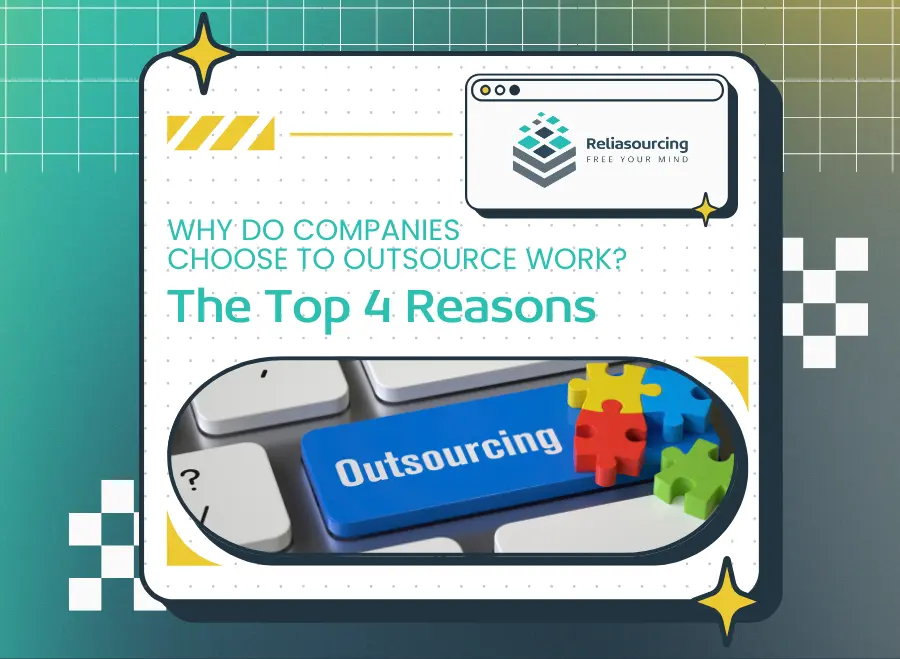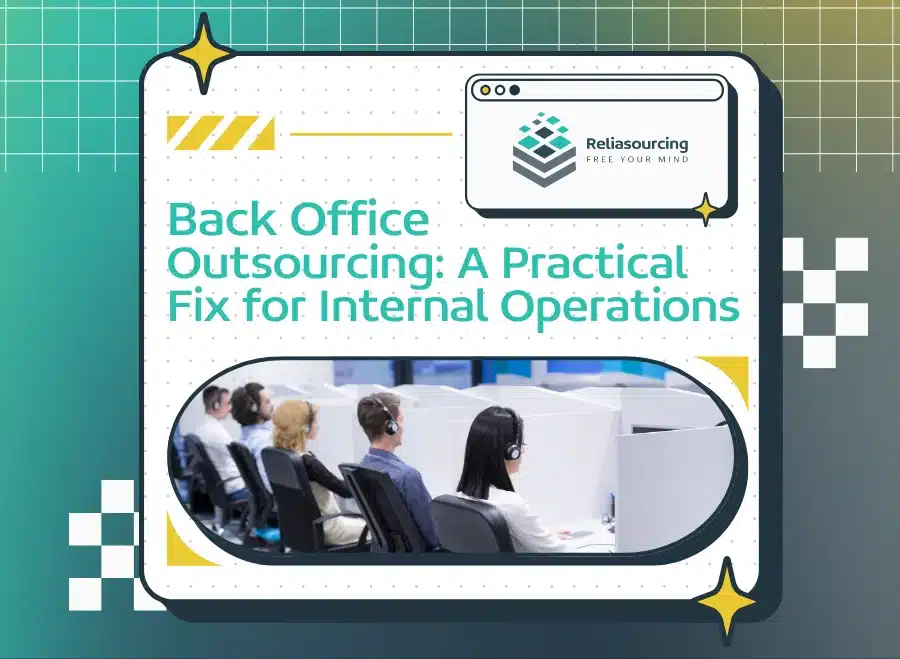Running a successful business means constantly balancing time, resources, and costs. As competition heats up in every industry, the pressure on companies to streamline operations without sacrificing quality is higher than ever. This is where outsourcing comes in. Many businesses, both large and small, are turning to outsourcing as a smart strategy to meet their operational demands. But why do companies choose to outsource work, and what makes it such an attractive option?
Explore the core reasons behind outsourcing, how it can benefit businesses, and what tasks are typically outsourced. Along the way, find some of the common concerns and risks that come with outsourcing, and a few practical tips for businesses that are considering taking this route. This guide will help one better understand how outsourcing can work and why it’s become a go-to strategy for so many organizations today.
What is outsourcing?
Before diving into the reasons companies choose to outsource work, it’s important to first understand what outsourcing actually means. In simple terms, outsourcing refers to the practice of hiring external organizations or individuals to handle specific tasks or services that are traditionally performed in-house. These tasks can range from customer service and technical support to marketing and human resources.
Outsourcing can take many forms, including offshore outsourcing—where a company outsources work to a provider in another country—or business process outsourcing (BPO), which involves contracting out entire business processes like payroll, accounting, or IT management, to name a few. Delegating these tasks to specialized external teams can free up valuable time and resources for businesses to focus on their core activities.
While outsourcing was once considered a strategy only for large corporations, it’s now accessible to businesses of all sizes, thanks in part to advances in technology. In fact, many small and medium-sized businesses are using outsourcing as a way to compete in a global market without overextending themselves.
Why do companies outsource work?
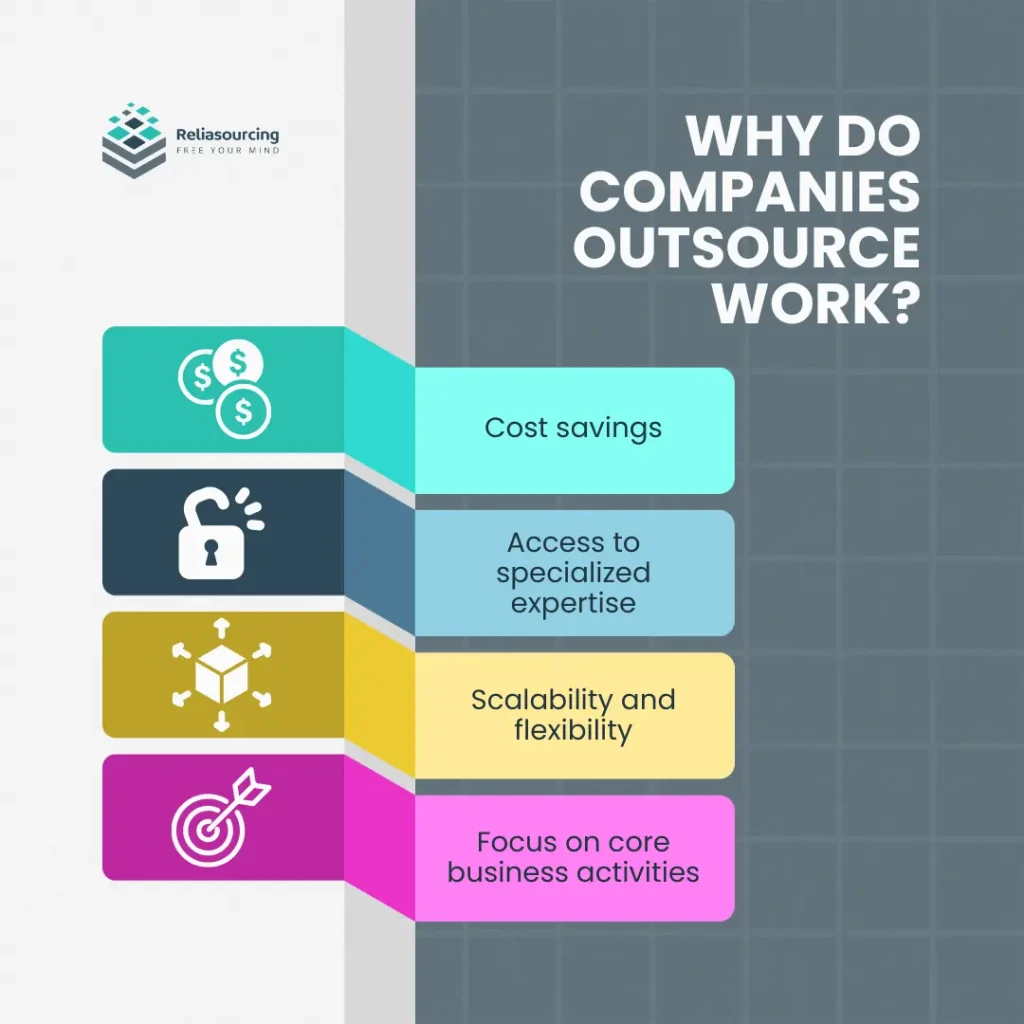
Outsourcing is a popular choice for businesses for several reasons. Some companies use it as a way to cut costs, while others are looking for specific expertise that may not be available in-house. Hence, here’s a breakdown of the most common reasons companies choose to outsource work:
1. Cost savings
One of the biggest reasons businesses outsource is to save money. Hiring employees in-house can be expensive, especially when one factors in salaries, benefits, office space, and equipment. Therefore, outsourcing certain tasks to third-party providers can reduce these overhead costs and often get the same (or even better) results for less money.
For example, many businesses choose offshore outsourcing to take advantage of lower labor costs in countries like the Philippines. This is particularly true for services like customer support, IT help desks, and back-office operations. Working with a managed services provider in a lower-cost region allows companies to save on payroll and other expenses while maintaining a high level of service quality.
2. Access to specialized expertise
Another major advantage of outsourcing is the ability to tap into specialized skills and expertise that might not be readily available in-house. Say, for instance, your business needs help with IT infrastructure or legal compliance, but there isn’t any right talent in-house, outsourcing allows the business to hire experts who are already well-versed in these areas.
This is particularly useful for businesses that need highly technical or industry-specific expertise. Business process outsourcing in the healthcare or financial sectors, for example, often involves partnering with providers who have a deep understanding of industry regulations and compliance requirements. Outsourcing these functions empowers companies in ensuring they meet legal and regulatory standards without having to invest heavily in building internal teams.
3. Scalability and flexibility
In the dynamism running through business environments, the ability to scale operations up or down quickly is crucial. Outsourcing provides companies with the flexibility to do just that. Instead of committing to long-term hiring and onboarding processes, businesses can scale their workforce or operations according to current needs.
If an e-commerce business experiences a surge in orders during the holiday season, it can outsource customer service to handle the increased volume without the need for permanent hires. This kind of scalability ensures that businesses remain agile and can adapt to changing market conditions without being weighed down by unnecessary fixed costs.
4. Focus on core business activities
Outsourcing non-core tasks allows business leaders and employees to focus on what they do best. For many companies, administrative functions, IT support, and HR tasks take up valuable time that could be better spent on strategic activities like product development, sales, and customer engagement.
Outsourcing these tasks serves to free up internal resources and redirect a business’ efforts toward growth and innovation. May it be offshore outsourcing for customer service or hiring a BPO firm to handle payroll and accounting, outsourcing helps companies stay focused on their core mission and long-term goals.
Common tasks companies outsource
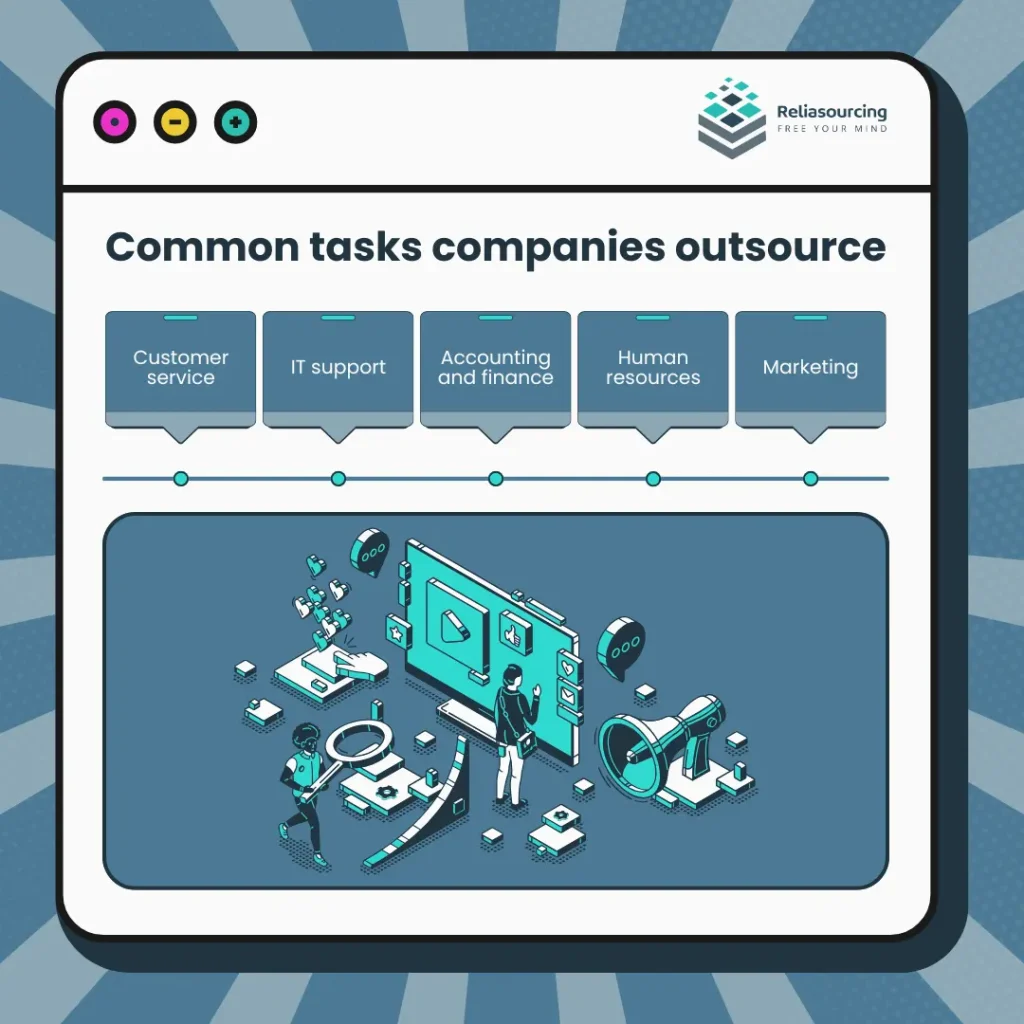
Businesses outsource a wide range of tasks and services depending on their needs, industry, and internal resources. Here are some of the most common functions that companies delegate to outsourcing providers:
- Customer service. Many companies outsource customer support to third-party providers to ensure that customers receive round-the-clock assistance. This is particularly common in industries like retail, telecommunications, and technology.
- IT support. From network management to software development, IT services are one of the most commonly outsourced functions. Companies outsource IT to ensure they have access to the latest technology and expertise without the expense of maintaining an in-house team.
- Accounting and finance. Businesses often outsource bookkeeping, payroll processing, and tax preparation to specialized providers to allow them to maintain compliance with regulations and improve financial accuracy.
- Human resources. Outsourcing HR tasks, such as recruiting, employee onboarding, and benefits administration, can save businesses time and help ensure that they are compliant with labor laws.
- Marketing. Marketing functions, including content creation, social media management, and search engine optimization (SEO), are often outsourced to agencies or freelancers. This gives companies access to creative and digital marketing expertise without needing to hire a full-time team.
Factors influencing outsourcing decisions
When it comes to companies choosing whether or not to outsource work, there are several factors that business owners and executives must consider. Understanding these factors can help businesses make informed decisions that align with their goals and needs.
1. Cost efficiency
Cost saving is one of the biggest driving forces behind why companies choose to outsource work. Businesses can choose offshore outsourcing to save on labor costs or work with a local provider for convenience, and still, the ability to reduce operational expenses remains the key consideration. Outsourcing allows companies to get results at a fraction of the cost compared to hiring internally.
2. Quality of service
While saving money is important, the quality of service provided by the outsourcing partner is equally critical. Businesses need to carefully vet potential providers to ensure they have the expertise, resources, and track record to deliver high-quality work consistently. Clear performance metrics and service-level agreements (SLAs) are essential in setting expectations and ensuring accountability.
3. Risk management
Outsourcing can help companies manage risk through the distribution of responsibilities across external teams. For example, if a business outsources its IT operations to a managed services provider, the risk of technical issues and downtime is transferred to the provider, who is responsible for maintaining uptime and data security.
4. Time to market
In industries where speed is a competitive advantage, outsourcing can help businesses get products and services to market faster. Leveraging the expertise of external providers can expedite company projects and streamline processes, giving them a competitive edge in fast-paced markets.
The risks and challenges of outsourcing
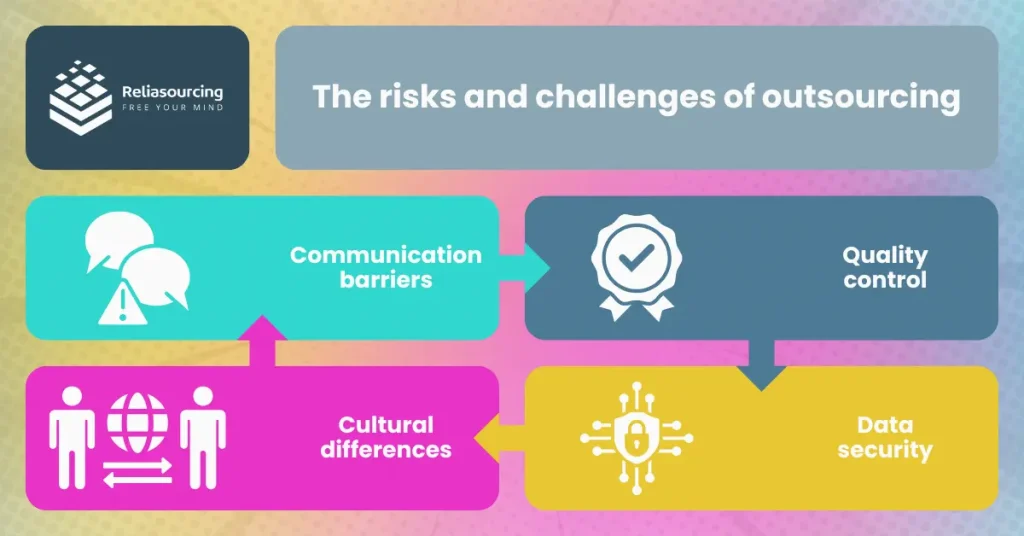
While outsourcing offers numerous advantages, it’s important to acknowledge the potential risks and challenges that come with it. Being aware of these risks can help businesses mitigate them and create more effective outsourcing strategies:
- Communication barriers. When outsourcing to providers in other countries, language and cultural differences can sometimes create communication challenges. Time zone differences can also complicate coordination, especially if there are tight deadlines or the need for frequent updates. Clear communication protocols and regular check-ins are essential for ensuring smooth operations.
- Quality control. Outsourcing means relinquishing some control over the tasks being performed, which can raise concerns about quality. To address this, businesses should establish clear performance metrics and regularly monitor the output of their outsourcing partners. Setting up feedback loops and conducting periodic reviews can also help maintain quality standards.
- Data security. With the growing importance of data privacy and security, companies must ensure that their outsourcing providers are compliant with data protection laws and have robust security measures in place, which is especially important for businesses handling sensitive customer information.
- Cultural differences. Cultural differences between companies and outsourcing providers can sometimes lead to misunderstandings or misaligned expectations. It’s important to work with providers who have experience collaborating with international teams and who can adapt to different business cultures and practices.
Frequently asked questions
1. How does outsourcing improve efficiency?
Outsourcing improves efficiency by allowing businesses to delegate non-core tasks to external experts, freeing up internal resources to focus on core activities. Outsourcing customer service or IT support, for instance, can streamline operations and improve productivity without the need for additional internal staff.
2. What are the financial benefits of outsourcing?
Outsourcing offers several financial benefits to businesses, the most significant being cost savings. Companies can lower their operational costs by outsourcing labor to regions with lower wage rates or by reducing expenses related to infrastructure, technology, and training. Additionally, outsourcing converts fixed costs, like full-time salaries, into variable costs, enabling businesses to scale up or down as needed without the financial strain of maintaining large in-house teams. This flexibility can also lead to improved cash flow and better financial management, allowing businesses to reinvest savings into growth initiatives.
3. What industries outsource the most?
Industries that rely heavily on outsourcing include technology, healthcare, financial services, retail, and telecommunications. In the tech industry, companies frequently outsource IT support, software development, and customer service. The healthcare industry, on the other hand, often outsources billing, transcription, and even certain medical services. Retail and telecommunications companies use outsourcing for supply chain management, customer service, and marketing operations. The financial services sector relies on business process outsourcing for accounting, payroll, and compliance tasks.
4. Is outsourcing beneficial for small businesses?
Absolutely. While outsourcing was traditionally associated with large corporations, it’s now a viable option for small businesses. Outsourcing allows small businesses to access specialized expertise, reduce costs, and scale their operations without the financial burden of hiring full-time staff. Offshore outsourcing or partnering with local firms is a viable solution for small businesses to stay competitive through the outsourcing of tasks like marketing, HR, and IT support, allowing them to focus on growth.
Summary
Outsourcing has become an essential strategy for businesses looking to cut costs, access specialized skills, and stay competitive in today’s fast-paced market. Understanding the key reasons behind outsourcing can empower businesses to make informed decisions about which functions to delegate to external providers. Managed services, offshore outsourcing, or full business process outsourcing are key outsourcing offerings that can provide massive benefits to companies of all sizes through the greater focus placed on core competencies, all while improving efficiency and scalability.
Ready to see how outsourcing can benefit your business? Explore Reliasourcing’s tailored services today and find the perfect outsourcing solution for your needs!

